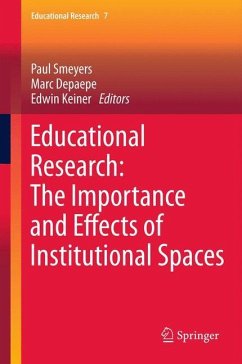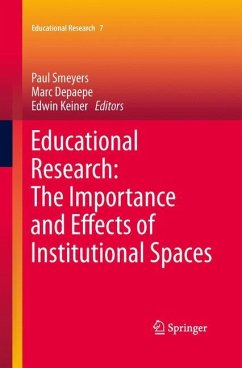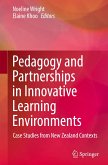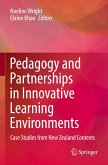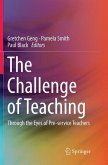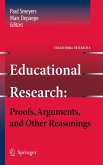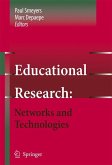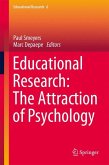This collection of fresh analyses aims to map the links between educational theory and research, and the geographical and physical spaces in which teaching is practiced and discussed. The authors combine historical and philosophical perspectives in examining the differing institutional loci of education research, and also assess the potential and the limitations of each. The contributors trace the effects of 'space' on educational practice in the classroom, in the broader institutions, and in the academic discipline of education-doing so for a range of international contexts.
The chapters address various topics relating to the physical and geographical environment. How, for example, does geographical space shape researchers' mental frameworks? How did the learning environments in which young children are taught today evolve? To what extent did parochialism shape America's higher education system? How can our understanding of classroom practice be enhanced by concepts of space? The book acknowledges that texts themselves, as well as the research 'arena', are 'spaces' too, and notes the fascinating debate on the concept of space in the field of mathematics education. Indeed, as more and more students move online, the book analyses the rising importance of virtual spaces such as Web 2.0, which have major educational implications for researchers and students joining the innovative 'virtual' universities of the future.
This publication, as well as the ones that are mentioned in the preliminary pages of this work, were realized by the Research Community (FWO Vlaanderen / Research Foundation Flanders, Belgium) Philosophy and History of the Discipline of Education: Faces and Spaces of Educational Research.
The chapters address various topics relating to the physical and geographical environment. How, for example, does geographical space shape researchers' mental frameworks? How did the learning environments in which young children are taught today evolve? To what extent did parochialism shape America's higher education system? How can our understanding of classroom practice be enhanced by concepts of space? The book acknowledges that texts themselves, as well as the research 'arena', are 'spaces' too, and notes the fascinating debate on the concept of space in the field of mathematics education. Indeed, as more and more students move online, the book analyses the rising importance of virtual spaces such as Web 2.0, which have major educational implications for researchers and students joining the innovative 'virtual' universities of the future.
This publication, as well as the ones that are mentioned in the preliminary pages of this work, were realized by the Research Community (FWO Vlaanderen / Research Foundation Flanders, Belgium) Philosophy and History of the Discipline of Education: Faces and Spaces of Educational Research.
Institutional spaces and places: what we do in them and what they do to us? Paul Smeyers, Marc Depaepe and Edwin Keiner have assembled a rich and varied collection, in which leading historians and philosophers of education bring much-needed critical attention to these matters. Covering the local and the universal, the concrete and the virtual, the metaphorical and the metaphysical, these essays challenge received assumptions and press questions of policy and practice in such a way as to chart new possibilities for educational research.
Paul Standish, Institute of Education, London, United Kingdom
If we consider that both 'education' and 'research' have become crucial myths in modern societies, the role and significance of 'educational research' cannot be underestimated. Smeyers, Depaepe and Keiner present a collection of essays that illuminate the sometimes subtle effects of institutional spaces on the practices and meanings of educational research. The wide rangeof practices and contexts addressed in this volume as well the analytical depth of the contributions makes this volume a major reference for all scholars interested in the critical dissection of 'educational research' as a scholarly practice.
Marcelo Caruso, Humboldt Universität zu Berlin, Institut für Erziehungswissenschaften, Berlin, Germany
Paul Standish, Institute of Education, London, United Kingdom
If we consider that both 'education' and 'research' have become crucial myths in modern societies, the role and significance of 'educational research' cannot be underestimated. Smeyers, Depaepe and Keiner present a collection of essays that illuminate the sometimes subtle effects of institutional spaces on the practices and meanings of educational research. The wide rangeof practices and contexts addressed in this volume as well the analytical depth of the contributions makes this volume a major reference for all scholars interested in the critical dissection of 'educational research' as a scholarly practice.
Marcelo Caruso, Humboldt Universität zu Berlin, Institut für Erziehungswissenschaften, Berlin, Germany

